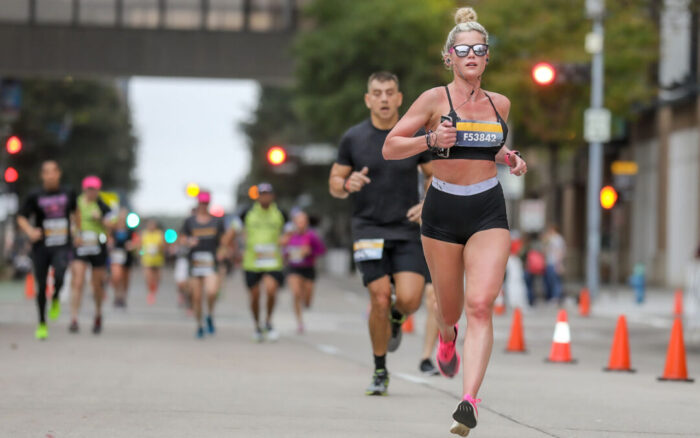Training plans prepare you for the miles, but the marathon has quirks you won’t find in the handbook. Some are mildly annoying, some are surprisingly tough, and all are easier to handle if you know they’re coming.
Here’s what veteran runners wish they’d known before their first 26.2.

1. The race might start with an hour of shivering in a corral
You don’t cross the line the moment the gun goes off. At big-city marathons, thousands of runners are funneled into corrals well before the start. That often means 30–60 minutes of standing still, sometimes in cold or rain. Bring old sweats, gloves, or a trash bag you can discard when the race begins—many events donate castoffs to charity. Without a layer, you’ll waste energy shivering before you’ve taken a step.
Related: 10 Things That Will Absolutely Ruin Your First Marathon
Race-morning logistics—bag drop, security checks, and endless porta-potty lines—can also take far longer than you expect. Build in a time cushion so you’re not sprinting to the start already stressed.
2. Your GPS will lie to you—again and again
“Phantom splits” are one of the first surprises in a marathon. Mid-race, your watch may suddenly show you running impossibly fast or frustratingly slow, even though your effort hasn’t changed. Tall buildings, tunnels, and thousands of devices around you can all throw the signal off.
Trust your body and use the course mile markers instead of obsessing over every ping.
Then, when you finally hit the finish, your GPS will deliver another twist. Almost no one’s watch shows exactly 26.2 miles—most read 26.4 to 26.6. That’s because it’s nearly impossible to run every tangent perfectly. It’s not an error, and it doesn’t mean you messed up; it’s just the reality of racing with a GPS strapped to your wrist.
Related: 8 Annoying Runner Problems (And How to Solve Them)
3. Drinking too much water can be dangerous
Most first-timers worry about dehydration, but the bigger risk is overdrinking. Taking in more fluid than you sweat out can dilute sodium levels in your blood, leading to hyponatremia. Early signs include nausea, bloating, and dizziness; if it progresses, confusion, seizures, or even collapse can follow.
The fix is simple: sip to thirst, and once your run goes past an hour, include electrolyte drinks along with water.
Keeping sodium steady helps your muscles and brain keep working when you need them most.
4. Your gut will suddenly crave something new
Around mile 20, strange cravings often hit—maybe orange slices, maybe salty broth, maybe whatever fuel your neighbor is holding.
That urge is deceptive. New foods or gels can upset your stomach, especially late in the race.
Stick to what you practiced in training and treat unfamiliar snacks as background noise. Gut comfort is important, especially in the final miles.
Related: Runner’s Diarrhea: How to Avoid a Stomach Disaster on Race Day
5. You’re more likely to wobble after the finish than during the race
Crossing the line isn’t the end of stress on your body. When you stop suddenly, blood pools in your legs, and it’s common to feel lightheaded or unsteady in the chute. Keep walking, grab fluids, and let your circulation catch up.
Most post-finish faintness resolves in minutes—it looks dramatic, but usually isn’t dangerous.
Related: What to Do if You Feel Unwell After a Race
6. Your medal moment might not feel how you imagined
You’ve pictured the finish-line photo, medal around your neck, grinning with joy. In reality, you may feel exhausted, teary, flat, or oddly numb. That’s normal—your body is depleted, and adrenaline is crashing.
The pride often shows up later, when you scroll through your photos or tell the story to a friend.
7. The post-marathon blues hit harder than you expect
You trained for months, finished the race, and suddenly the calendar is empty. Many runners feel restless or even sad in the days after a marathon. That means your brain and body are processing the drop from a major high.
The best antidote is patience. Give yourself time to recover first. Most runners need at least one to two weeks away from structured training, and full physical recovery can take three to four weeks, depending on your fitness and how hard you raced. Only after that rest window will you feel ready to lace up again with energy.
In the meantime, plan light recovery runs, walks, a massage, or cross-training, and set a small new goal to ease the transition.
Related: 10 Signs You Might Not Be Ready for a Marathon
Your first marathon will surprise you in ways no plan can fully explain. The best strategy is to expect the unexpected: allow extra time on race morning, pace by feel, keep fueling simple, and give yourself grace in the days that follow.









